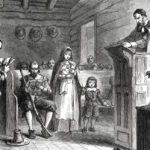Part 6 of TGCA’s series on The Apostle’s Creed
Jesus’ birth was, presumably, much like any other: a nervous agonised mother; tears and blood and fluid; a baby sucking in first breaths; a relieved father. Yet he was a child like none other, and that goes back to his conception.
Mary was a virgin when she was pregnant with Jesus (Matt 1:18,25; Lk 1:27,34) and he was conceived through the special work of the Holy Spirit (Matt 1:20; Lk 1:35).
The Virgin Birth is the basis of Jesus’ genuine and unique human life. He was fully human from the very beginning.
The Virgin Birth is the basis of Jesus’ genuine and unique human life. He was fully human from the very beginning. Like each of us, he grew in his mother’s womb. There was nothing pretend about his humanity. Yet he was the start of a renewed humanity, born from the old. God’s redemption and restart for the fallen children of Adam.
The teachers of the early church recognised that the Virgin Birth was key to the gospel and included it in the summary of apostolic teaching (in what was called the “rule of faith”). So, it became part of the Apostle’s Creed. Later thinkers have wondered if the Virgin Birth matters and have suggested it can be discarded from Christian doctrine as pious mythology. This misses how deeply it is woven into God’s work of redemption.
A close look at how the Gospels present Jesus’ birth and especially the connections they make with the Old Testament shows the importance of the Virgin Birth.
God promised that redemption would come with a child. Bearing and raising children was at the heart of the human task in creation. Adam and Eve were to subdue and rule creation as they filled it with their offspring and developed family life and human culture (Genesis 1:28). With the fall, childbirth became difficult and dangerous, but was the source of human hope. The very first form of the gospel was that the offspring of Eve would crush the Serpent’s head (Gen 3:15). The Bible is filled with genealogies because, by God’s promise, hope lay in a child. Jesus is the long-awaited child, after him, there are no more biblical genealogies.
The Gospels draw on major biblical themes about the promise children to present the birth of Jesus. Luke emphasises that Jesus, like Adam, is the Son of God (Luke 1:35 3:38). He is the seed of Abraham (Matt. 1:1–2; Lk 3:34), the fulfilment of God’s promise to the patriarch (Gen 12:2-3; 15:5; 17:7). He is God’s Son and a holy one (Lk 1:35)—a new Israel. He is also the new Davidic king (Matt 1:20; Lk 1:27, 32-33). Matthew presents the Virgin Birth as the fulfilment of Isaiah 7:14—“The virgin will conceive and give birth to a son, and they will call him Immanuel” (Matt. 1:22–23). This is part of an extended prophecy about children (Isa 8:1-4, 18) which climaxes in the promise of the king who will bring God’s kingdom and reign on David’s throne (Isa 9:1-7).
The Virgin Birth shows that we could never achieve our own redemption. God had to act to bring a new creation.
The Virgin Birth shows that we could never achieve our own redemption. God had to act to bring a new creation. Jesus’ conception was a special work of the Holy Spirit who overshadowed Mary (Luke 1:35) in the same way he hovered over the waters at creation (Gen 1:2). In Mary, he formed a new start to humanity. Jesus then lived his whole life in union with God by the work of the Spirit.
A traditional view is that the Virgin Birth was necessary so Jesus would not have a sinful nature nor inherit original sin. These are an implication of Gospels’ presentation, though they say more. Jesus is not only free from sin; he is root of a new humanity. God entered into humanity to remake us. He did for us what we could never do for ourselves. The incarnate God reversed the curse on Adam, fulfilled his own promises to Abraham, faithfully kept Israel’s calling and ruled as David’s greater son.
There will continue to be debates about the historicity of the Virgin Birth. (Andreas Köstenberger’s review of Andrew Lincoln’s Born of a Virgin? gives review of some of the arguments). There is a lot at stake in that debate. If the Virgin Birth is a pious myth then it is not the historical fulfilment of God’s promises to renew humanity. The early church was right to place the confession that “he was born of the Virgin Mary” in the Apostles’ Creed.















